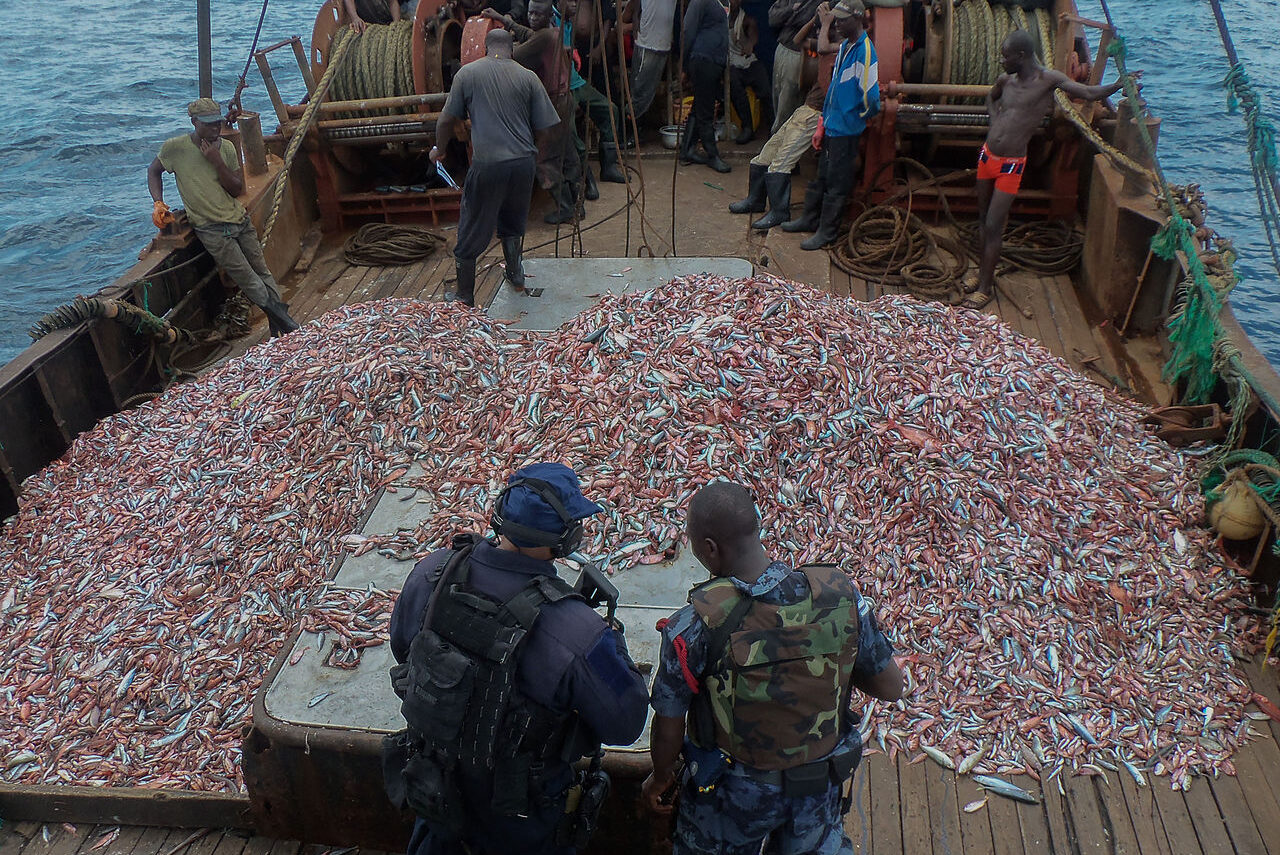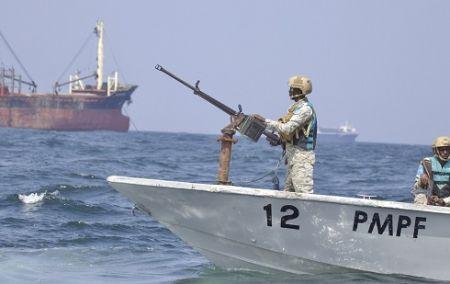17,000 Chinese and European trawlers continually plunder the African seas to satisfy our Western palates. This injustice which occurs offshore, out of sight, gives rise to human and animal exploitation, conflicts and ecocides. Immersion at the heart of an underestimated drama.
“Could China’s industrial fleet deplete the West African seabed? » wondered France Info in 2018. Already the previous year, Greenpeace renewed its alert concerning “the shameless pillaging of African waters”, left in the hands of all trafficking and Sino-European overfishing without any real control. Today, despite seven years of media coverage, the phenomenon, far from receding, even seems to be getting worse.
This is evidenced by the alarming observation of the docu-fiction “Pillages” by Maxime de Lisle and Renan Coquin, helped by the activist Camille Etienne and the philosopher Baptise Morizot. Published this spring by Delcourt, this comic strip reveals with talent and sensitivity the critical situation suffered by the African coast. The opportunity to return to the broad outlines of a devastating neocolonial extractivism.

@Delcourt
Looting: a post-colonial phenomenon that lasts
In 1985, there were a few dozen ships on the African high seas. Thirty years later, there are now thousands of them sharing a fishing resource in free fall. According to the Environmental Justice Foundation (EJF): more than 90% of industrial trawlers plying Ghana’s waters are owned by Chinese companies.
In fact, if colonization might seem to belong to the (near) past, in reality it continues to hit the continent indirectly, notably through the financial windfalls of the second largest economic power in the world.
From this ideological-politico-economic perspective, China has therefore allowed itself to monopolize the waters of around ten African countries including Gambia, Guinea, Guinea-Bissau, Mauritania, Senegal, Sierra Leone, Liberia, Nigeria and Ivory Coast in West Africa, but also, beyond, those of Cameroon, the Republic of Congo, Gabon, South Africa and Namibia.
“In the exclusive economic zone off the coast of Mauritania, trawlers and longliners flying the Chinese flag have, for example, fished for more than a million hours in 2022,” specifies Afrimag.

@https://www.afrik.com/
However, although Beijing assures that its fleet is under control, the news follows one after another concerning the illegality of its overfishing, mainly on the bottom: in 2017, no less than eight Chinese trawlers were arrested around Sierra Leone, Guinea Conakry and from Guinea Bissau. A year later, in 2018, the Chinese boat named “Guoji 809” was also caught on the spot by the Liberian coast guard, the deck full of illegally caught fish, still alive.
And for good reason, faced with the democratization of meals based on animal protein, the total production of fishing and aquaculture has exploded in the world since the middle of the century, going from 19 million tonnes in 1950 to the historic record of 179 million in 2018, informs Pillages. And at the peak of demand is France, with one of the highest fish consumptions in Europe, i.e. 35kg per French person for an average of 22kg per European.
Of these West African fisheries in particular, the European Union is the main customer. And, contrary to popular belief, it is not always intended for Western tables, at least not directly. In fact, these catches are then used to make animal meal intended for industrial livestock farming, as reported by Jeune Afrique:
A cost for the environment and biodiversity

Gannet Heligoland @Wikicommons
In addition to the pressures exerted on marine populations, the threats of overfishing also extend to other species dependent on the ecosystem balance of the geographical area. This is particularly the case for gannets and shearwaters. These migratory birds protected in Europe are confronted, once off the African coast, with a lack of fish plundered by factory ships.
Otherwise, when they are not starving where the waters were once rich in fish, these animals face other dangers, such as trawler nets or hunting. In 2013, Reporterre points out: “The Mauritanian authorities seized eight containers filled with frozen seabirds (10,000) falsely stamped “fish” intended to be consumed.”
These diversion strategies are legion and indeed form precisely the heart of the problem: without supervision, when the authorities are involved in trafficking and the political spheres are complicit in the circumstances, how can viable solutions be achieved?
Lack of control
On site, the testimonies overlap and report a silence around illicit practices which thus escape the slightest inspection.
Looting: African seas emptied by China and Europe

Ghana @U.S. Navy photo by Kwabena Akuamoah-Boateng/Released/Wikicommons
For example, in a proportion that is difficult to verify, foreign ships sometimes operate under the local flag in a completely illegal manner, thus casting doubt on liability in the event of mistreatment, accidents or death. Without a legal framework, rife with bribes, foreign fleets like the authorities are governed by the law of silence. Their holders thus escape the slightest investigation that could arise into compensation for the families of missing or injured sailors.
On the other hand, even if the guards were of good will, the means are sorely lacking. The control services have a few stars and little regional support. Even more decisive is the lack of homogeneity of regional regulations from one zone to another, facilitating legal loopholes.
According to Greenpeace, illegal fishing (local and foreign) would ultimately cost West Africa more than $2 billion per year. An economic hole which is not the only harm done to the region.
Abandoned premises, exploited fishermen

Looting @Delcourt
Fishing is vital for 15% of the local population, recalls Pillages. However, faced with the growing lack of marine life and being no match for international giants, small fishermen are selling their licenses to foreign companies in the hope of buying more modern equipment that will take them out of the loop. misery. The paradox is that they thus enter into a race which exhausts precisely the source to be reached.
“THE BOATS THAT OPERATE IN THESE AREAS ARE USUALLY LONGER THAN FOOTBALL FIELDS AND LITERALLY SUCK THE OCEAN FLOOR,” “SCAM ON AFRICAN COASTS,” GREENPEACE.
The problem, beyond the growing license traffic, is that industrial trawlers obviously respect neither the quotas, nor the borders of prohibited zones, nor the selectivity of species. They scrape the sea, leaving graveyards of biodiversity behind them and deserts without sustenance for coastal cities.
For France Info, the Ocean campaign manager at Greenpeace Africa Ibrahima Cissé emphasizes the immediate weakening of the territories: “In West Africa, fish represents an important source of protein and generates income and jobs for some 7 million people. people. The depletion of fish stocks has extremely worrying repercussions on food security and the economy of countries that are among the most vulnerable in the world.”
Free, without subsidy and independent for 10 years, we need you to continue this work in 2024. Feel free to activate a voluntary subscription on this link by offering tea to the team. Thank you so much.
On board large ships, conditions are no better. If their behind the scenes are often inaccessible, the scandal of the Indonesian crews exploited and beaten aboard the Wei Yu 18 on the Chinese high seas – revealed by a Le Monde investigation at the end of 2023 – refers to total impunity within these micro-societies isolated.
The testimony of Bright Tsai Kweku to BBC News Africa, Bosun officer in charge of equipment and crew on Chinese ships in Ghana, confirms this: “They beat them, they spit on them, they punch them of foot « . Once, he adds, a member fell ill with cholera but, priority being given to profitability, the ship did not want to dock to treat him; he did not come back alive.
Indeed, Maxime de Lisle and Renan Coquin remind us in this sense, in a graph inserted at intervals from the stories of their characters, that our world has around 130,000 slave fishermen. Made up of cheap immigrant or poor labor, the crews are subjected to many horrors, such as illness, lack of care, serious injuries, physical, psychological and sexual abuse, and even death. .
“OUR WORLD HAS AROUND 130,000 SLAVE FISHERMEN”
Unemployed local fishermen and abused sea workers sometimes go to the city to look for work in a saturated market. This is how, once the only way to survive was the prospect of migrating to Europe, they then face xenophobia and racism which perpetuates mistreatment or sends them back home, where the West continues its ravages.
In this sense, the responsibilities are multiple and labyrinthine. Beyond the harmful directives of large private groups in which the silence of States is complicit, this situation is also the result of opaque agreements signed between the leaders of West Africa and foreign countries, against the interest of the populations.
Corrupt politicians of all stripes, CEOs and elected officials bathed in conflicts of interest, a globalized economy hungry for resources, permissive neocolonial paternalism,… the factors are complex and the actors wet up to their necks in an extractivist one-upmanship left without supervision or consideration long-term for local livelihoods or the environment. It is this double issue, human and environmental, which gave birth to the comic strip Pillages and gave it both its richness and its depth.
Looting: the public utility comic strip
“DEFEND ENVIRONMENTS, PEOPLE AND WILD ANIMALS TOGETHER.”
The philosopher Baptiste Morizot confides in the preface to Pillages that he met Maxime de Lisle on a Sea Shepherd boat, the Bob Barker. At the time, he was sailing on the waters of the Gulf of Guinea to intercept illegal trawlers: “This African mission of the NGO linked together three issues: defending marine environments against extractivism, preventing the illegal killing of forms of marine life and fight against industrial trawling which destroys artisanal fisheries, weakening the entire social fabric of the coast of Benin. The stroke of genius of this mission was there: to defend the environment, people and wild animals together. »

Looting @Delcourt
Not forgetting to defend people is precisely the feat of this human-level album which manages to convey, through the realistic traits of its characters, the complex workings in which individuals are caught.
Escaping any form of Manichaeism, the two authors thus depict with great accuracy the legitimate environmental activist who wants to preserve ecosystems from a criminal lack of regulations, such as the cheated local fisherman, up to the Chinese captain with illegal practices himself. “caught in the net of an economic system gone mad”.
Through the boxes, more than looting, it is ultimately a question of bringing out the sprawling influence of economic globalization on lives. By unraveling the meshes of the giant heist plaguing the African high seas, Pillages finally reveals one of the most striking examples of the irrationality of the old world.
What to do ? Getting informed is a first counter to powerlessness: read or offer Pillages from Delcourt editions. An extract of several pages is available free of charge in digital version.




